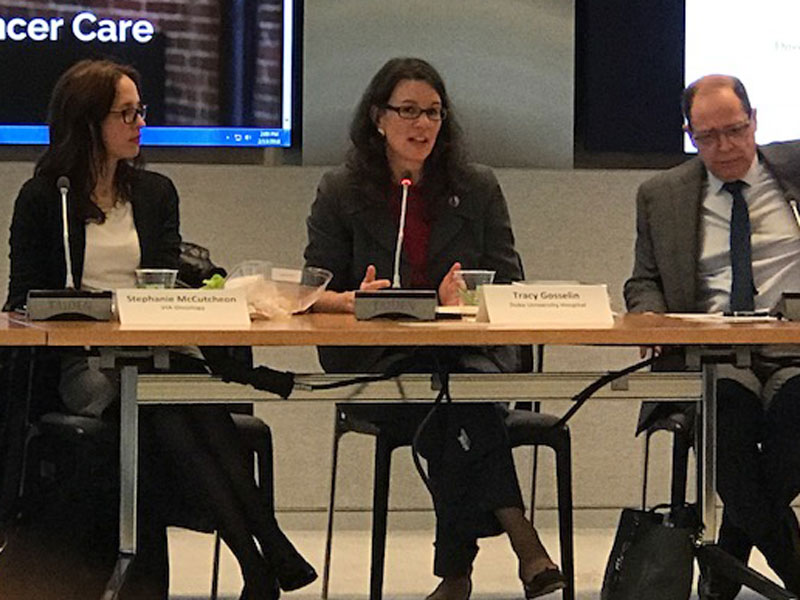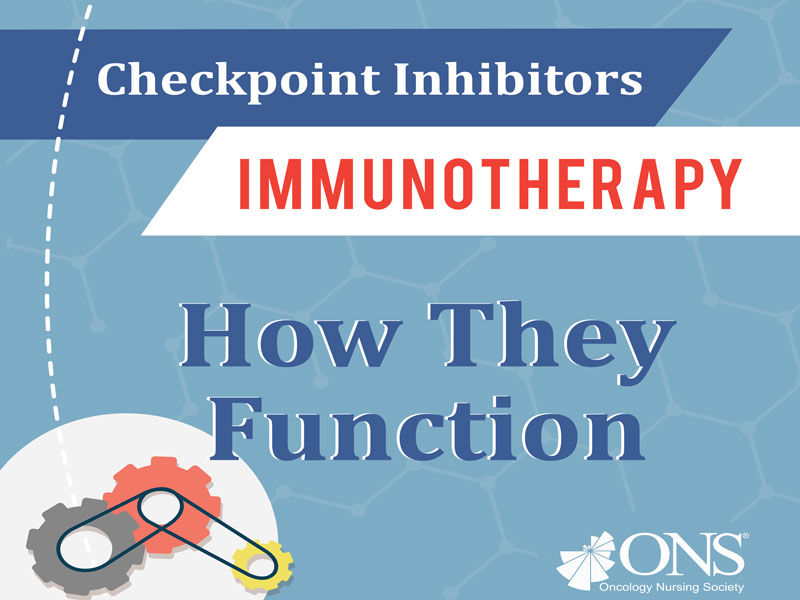ONS Member Advocates for Patient Involvement in Clinical Pathways

I was selected to represent ONS as a panelist at the Cancer Innovation Coalition meeting held in Washington, DC in February 2018. The meeting, “Integrating Patient Perspective into Clinical Pathways: A Dialogue Between Stakeholders,” brought together patient advocates, healthcare professionals, and technology stakeholders to address and identify the importance of patient-centered care and involving patients in clinical pathways. The National Patient Advocate Foundation released an article outlining the topics covered in our discussion.
ONS Board Looks In the Rearview Mirror as We Cruise Ahead

To save costs and reduce the number of meetings, the ONS Board combined the traditional January and March meetings into a late-February meeting. It served as my final in-person board meeting, a bittersweet moment filled with reflection on ONS’s past, present, and future.
Cancer and Immunotherapy Organizations Release Checkpoint Inhibitor Side Effect Guidelines

New guidelines and consensus recommendations for managing immune-related adverse events (irAEs) from checkpoint inhibitors are available from several key cancer and immunotherapy organizations: a collaboration between the American Society of Clinical Oncology and National Comprehensive Cancer Network, and a separate consensus recommendation from the Society for Immunotherapy of Cancer. ONS contributed to the development of both sets of guidelines.
- Read more about Cancer and Immunotherapy Organizations Release Checkpoint Inhibitor Side Effect Guidelines
- Add new comment
CDC Has New Director Designee

Presidential appointees come, and presidential appointees go. Recently, the Center for Disease Control and Prevention’s (CDC’s) director resigned for financial conflicts of interest. The new Department of Health and Human Services (HHS) secretary, Alex Azar, sought to fill the important public health role as soon as possible. With opioids, the flu, vaccine shortages, and cancer prevention under the purview of the CDC, finding a new director was crucial to continuing the agency’s work. Since many of the CDC’s top officials are often reported on in the news, replacing the director was also essential for public trust in public health.
Expressive Writing Can Help Patients Understand and Process Their Cancer Diagnosis

Writing images from one’s memory and imagination can be a healing act. According to a recent study on expressive writing and patients with cancer, some individuals may benefit from participating in expressive writing as part of their supportive cancer treatment. The writing act can be a form of healing for patients struggling with their cancer diagnoses.
- Read more about Expressive Writing Can Help Patients Understand and Process Their Cancer Diagnosis
- Add new comment
President’s Cancer Panel Reports on Drug Costs and Value

Although it’s one of the less visible commissions, the President’s Cancer Panel monitors the activities of the National Cancer Program and reports on the burden of cancer. The panel reviews a number of topics and keeps current with demographic information and the latest cancer incidence research. After reviewing and recommending based on existing data, the panel releases a formal report to the president. In its most recent report, the panel found serious issues with barriers to access for cancer survivors, and it addressed the costs of drugs and the value therein.
Supportive Care Programs for Patients With Cancer

Focusing on a patient’s quality of life is often a key component to their successful cancer journey. Treating their disease is crucial, but patients have to be recognized as individuals with unique and varying needs. Addressing their emotional, physical, spiritual, and psychosocial stressors can help provide holistic treatment that’s at the heart of successful oncology care.
Medicare Cracks Down on Opioid Prescriptions, Abuse; Health Care Tops Poll of American Worries; Leading Chemotherapy Researcher, Physician Dies at 92

An estimated 14.4 million Medicare recipients were prescribed some form of opioid treatment in 2016, paid for by their Medicare benefits. In an attempt to help curb the national opioid epidemic, officials from the Center for Medicare and Medicaid Services (CMS) announced that Medicare would no longer pay for long-term, high-dose prescription pain medication. Unsurprisingly, the plan received flak from patient and provider advocacy groups alike. Opponents to the CMS announcement decried the efforts, citing barriers to crucial medications needed for patients in chronic or severe pain—including those with cancer.
- Read more about Medicare Cracks Down on Opioid Prescriptions, Abuse; Health Care Tops Poll of American Worries; Leading Chemotherapy Researcher, Physician Dies at 92
- Add new comment
FDA Authorizes Direct-to-Consumer Test for BRCA Cancer Gene

Genetic testing is becoming more recognized among the general public, due in part to news reports and celebrity endorsements. Now, people are seeking to understand cancer risks and prevention measures through genetic information. There are many companies that ask for a mere mouth swab and deliver insight into a person’s DNA. As this becomes more commonplace, those with familial predisposition to cancer will look for ways to understand their own genetic results. Recently, the U.S. Food and Drug Administration (FDA) approved an at-home test identifying some—but not all—breast cancer genes.
NIA Promotes Smoking Cessation

In a new message, the National Institutes of Health’s National Institute on Aging (NIA) division introduced a public health campaign concentrating on smoking cessation for senior citizens. The program elaborates on a central theme that says, “No matter your age, quitting smoking improves your health.” The agency lists the benefits of cessation, including the critical health impact that diseases have on those who continue to use tobacco.





